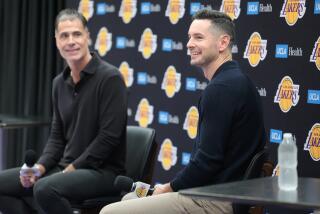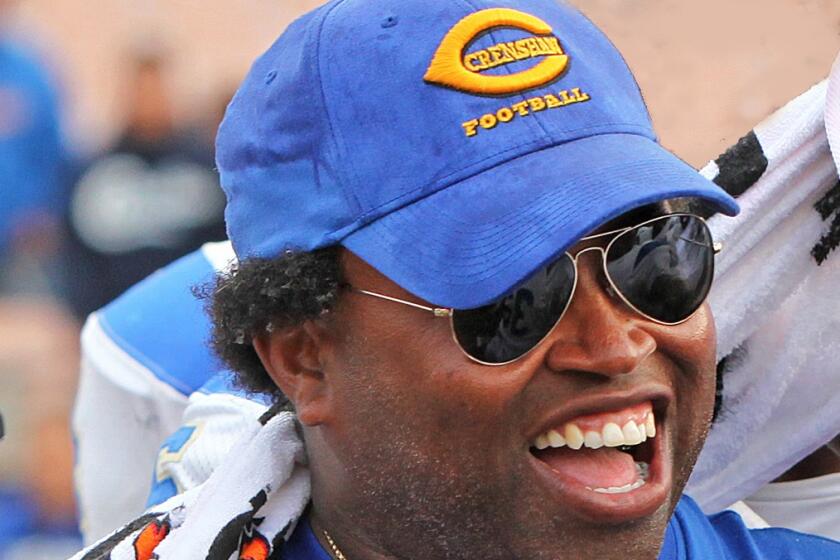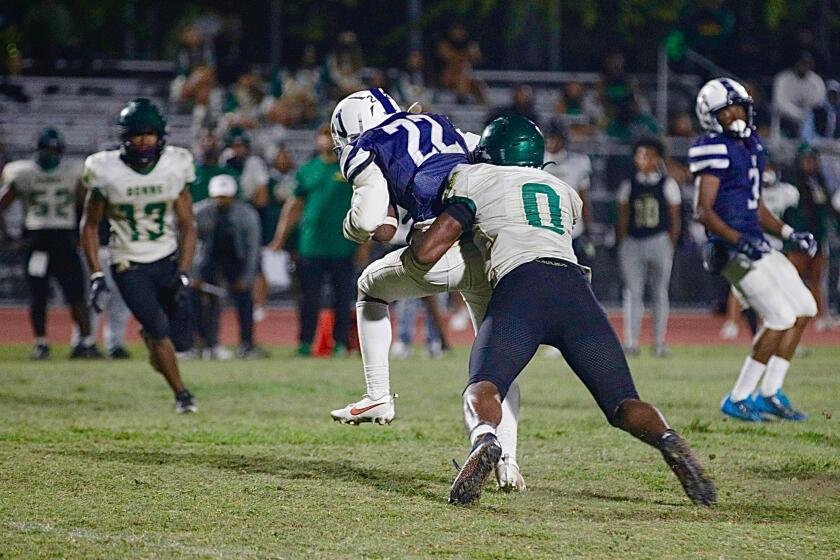Divac, Hornets Open Dialogue
Vlade Divac took his first step Saturday toward accepting a future as a Charlotte Hornet, speaking by phone with Bob Bass, the clubâs vice president of basketball operations, and Coach Dave Cowens and, just as important, agreeing to talk again today.
If this wasnât a breakthrough, it was at least a thaw. Divac had refused to so much as entertain the possibility of leaving Los Angeles for the Carolinas or anywhere because he did not want to uproot his family from a city it has grown to love, and now heâs scheduling future conversation.
Hornet officials are encouraged, though still not ready to say the handshake deal that would send Kobe Bryant to the Lakers will definitely come off when salary-cap technicalities are cleared up July 9. They want to know that Charlotte isnât giving up a tremendous prospect for the honor of getting stiffed.
Divac, an emotional player perhaps wounded by being traded, especially as salary-cap ballast to lure Shaquille OâNeal, might want to make sure heâd be wanted. As if the Hornetsâ showing this much patience isnât enough of a sign? So everyone talked, he felt better, they felt better, and the chances of the deal improved, a day after the possibility of it falling through emerged in Charlotte.
Heâll be wanted. Cowens, the rookie coach, is a former star center with the Boston Celtics who takes over a team that last season used Matt Geiger (respectable at 11.2 points and 8.4 rebounds in 30.5 minutes), George Zidek (4.0 points and 2.6 rebounds) and Robert Parish (3.9 and 4.1) in the pivot. The Hornets need this deal a million times more than they need Bryant, drafted for the Lakers anyway.
The Hornets want to finally give Larry Johnson a permanent move to small forward, so Divac would be the new anchor inside, maybe at center and maybe at power forward, which many believe is his natural position anyway. As with the Lakers, that could be decided on a game-by-game basis depending on the defensive matchups. Geiger is the other starter for now, but they also plan to be involved in the free-agent market.
Meanwhile, the trade would give the Lakers spending power starting July 9 that few teams could match, as if the clout of being OâNealâs first choice should he decide to leave Orlando isnât enough.
If the Divac deal goes through, the Lakers could offer OâNeal $8.53 million for 1996-97 with allowable increases of up to 20% of that figure every year through 2002-03, $95.5 million in all. If they were to renounce the rights to Elden Campbell, which they donât want to do, and their other six free agents, the Lakers could put together a package that starts at $11.98 million for next season.
Figures obtained from league sources show that even the lesser amount puts the Lakers in the upper echelon for line of credit.
Seattle has $11 million, but the SuperSonics have very little actually to pay out because getting to that figure would mean renouncing Gary Payton and Hersey Hawkins, which wonât happen. The same goes for the Detroit Pistons, at $10 million on paper but $7.7 million in reality since Allan Houston is a keeper. Washington only gets its $8.2 million by renouncing (or losing) Juwan Howard, Utah its $9.5 million by cutting loose John Stockton, which will never happen.
Who has ârealâ money?
The New York Knicks, ready to say farewell to Derek Harper without regret, will have $9.4 million. The Miami Heat, with no need for Alonzo Mourning if it can land OâNeal, would renounce the Hornetsâ former starting center along with Tim Hardaway to get to $13.2 million.
NBA Notes
The Dallas Mavericks traded forward Cherokee Parks to the Minnesota Timberwolves in a deal that will put the Mavericks about $3 million under the new NBA salary cap. For Parks, a first-round pick last year, Minnesota agreed to remove the lottery protection on the 1997 first-round pick Dallas acquired from the Timberwolves in the 1994 Sean Rooks trade.
Under the original terms, Minnesota would have kept the 1997 pick if it landed in the top six, in which case Dallas would receive the Timberwolvesâ No. 1 pick in 1998 unconditionally. Now, Minnesota will keep the 1997 pick only if it is the No. 1 pick overall.
Parks played in 64 games for Dallas as a rookie, averaging 3.9 points and 3.4 rebounds. He scored a season-high 25 points with seven rebounds against Portland on March 17. It appeared likely he would be traded after the Mavericks sent their No. 6 pick in the first round and a first-round pick in 1997 to the Boston Celtics on June 21 for center Eric Montross and the No. 9 pick, which they used on power forward Samaki Walker.
More to Read
Go beyond the scoreboard
Get the latest on L.A.'s teams in the daily Sports Report newsletter.
You may occasionally receive promotional content from the Los Angeles Times.










